#Hebrew Bible
Text
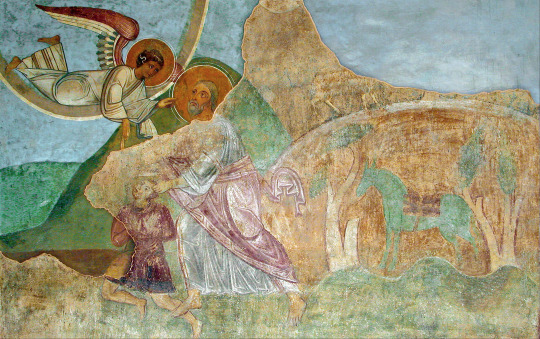
Abraham's sacrifice of Isaac is halted by an angel. Fresco in St. Sofia Cathedral, Kyiv, Ukraine, painted ca. 1000.
#art#art history#Middle Ages#medieval#medieval art#Ukraine#Ukrainian art#religious art#Biblical art#Christian art#Sacrifice of Isaac#Old Testament#Hebrew Bible#Book of Genesis#fresco#Orthodox Christianity#Eastern Orthodox
253 notes
·
View notes
Text

The world’s first printed book in Hebrew was Rashi’s commentary on the Bible, printed by Abraham ben Gart in Reggio di Calabria, Italy, in 1475.
Unfortunately, very little is known about the personal life of Abraham ben Garton. Most scholars believe he was born in Spain, and emigrated to Southern Italy's Calabria prior to the expulsion of the Jews from Spain in 1492. Many other Spanish Sephardim also emigrated to Calabria following the expulsion.

The 1475 edition Abraham Garton created and employed, for the first time, a typeface based on a Sephardic semicursive hand. It was this same style of typeface that a few years later, when commentary and text were incorporated onto one page, would be used to distinguish Rabbinic commentary from the text proper. Ultimately, this typeface would be known as Rashi script.
View of the Interior of one of the chapels in the Cathedral of Reggio di Calabria—ancient Rhegium. This chapel focuses on the "giving of the law" to Moses. Note the prominent menorah.

Follow us on Instagram, @calabria_mediterranea
#reggio calabria#calabria#italy#italia#italian#south italy#southern italy#mediterranean#europe#book#books#hebrew#jews#jew#judaism#jews and judaism#history#talmud#hebrew bible#jewish history#menorah#religion#church#cathedral#architecture#religious#jewish culture
83 notes
·
View notes
Note
Character ask: Queen Esther
Favorite thing about them: Her courage and selflessness when she risks her life to save her people, and her cleverness in the way she uses flattery, entertainment, and well-chosen wording to maneuver the villainous Haman into a vulnerable position and turn her royal husband against him.
Least favorite thing about them: I suppose the fact that at first she's reluctant to approach the king without being summoned and come out as Jewish to him. Of course it's natural that she's afraid to risk her life, but still, thousands of other people's lives are on the line and she almost chooses to protect herself rather than them.
Three things I have in common with them:
*I'm part Jewish.
*I'm often afraid to reveal my Jewish heritage in public.
*I often wear purple – most mass-produced Queen Esther costumes for Purim seem to dress her in purple, since it was associated with royalty in the ancient world.
Three things I don't have in common with them:
*I'm not married to a king.
*I'm not an orphan.
*I've never been to the Middle East.
Favorite line:
Her instructions to Mordecai when she agrees to speak to the king on the Jews' behalf:
"Go, gather together all the Jews who are in Susa, and fast for me. Do not eat or drink for three days, night or day. I and my attendants will fast as you do. When this is done, I will go to the king, even though it is against the law. And if I perish, I perish.”
Her reveal of her Jewish heritage to her husband, with its clever rhetoric of saying that she and her people are threatened, arousing her husband's protective outrage, before she reveals that by this she means Haman's planned genocide of the Jews that her husband had blindly agreed to:
“If I have found favor with you, Your Majesty, and if it pleases you, grant me my life—this is my petition. And spare my people—this is my request. For I and my people have been sold to be destroyed, killed and annihilated."
brOTP: Her cousin and foster father Mordecai.
OTP: Well, I have to say her husband King Ahasuerus, though it's hardly a modern love match, and though there are plenty of valid reasons to loathe him and wish Esther could leave him. If not for their marriage, she couldn't have saved her people.
nOTP: Haman.
Random headcanon: I accept the Talmudic tradition that she was a vegetarian rather than eat non-kosher meat in her husband's palace, but not the tradition that she lived on only legumes and seeds. While I understand the appeal of saying "Out of virtue and piety she turned down the most tempting dishes in favor of plain, simple food," that's not a balanced diet, and Persian cuisine has so many wonderful vegetable dishes she could have chosen from!
Unpopular opinion: I don't think she and Queen Vashti need to be pitted against each other. While I don't like the tradition of vilifying Vashti in order to glorify Esther as the superior, deserving replacement, neither do I think admiring Vashti's courage and defiance means we should look down on Esther for being "docile and submissive" or "complicit with the patriarchy." After all, it's by finally breaking the rules that Esther saves her people, and ironically, despite having banished Vashti for her disobedience and chosen Esther as a suitably docile replacement, Ahasuerus obeys Esther's will in the end. I admire and sympathize with both women and see Vashti as ultimately vindicated by Esther.
Song I associate with them: Well, it's mainly a song about Haman, not Esther, but I have to choose this popular silly children's song for Purim, "A Wicked, Wicked Man." It's the song I most associate with the holiday.
youtube
Favorite picture of them:
These various paintings.

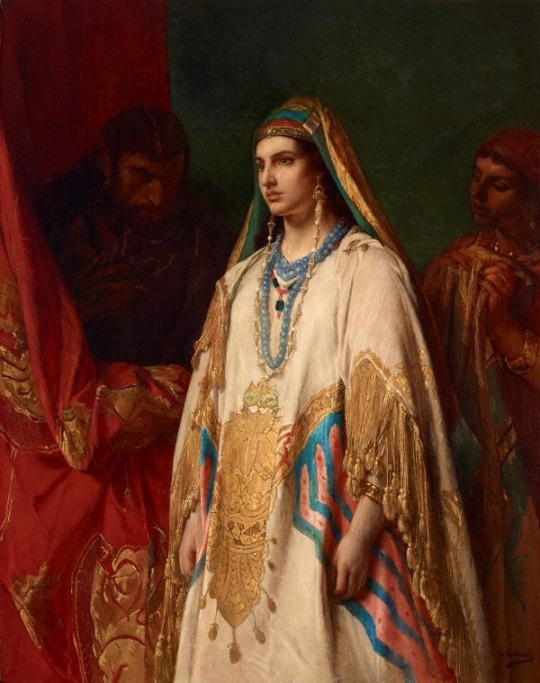


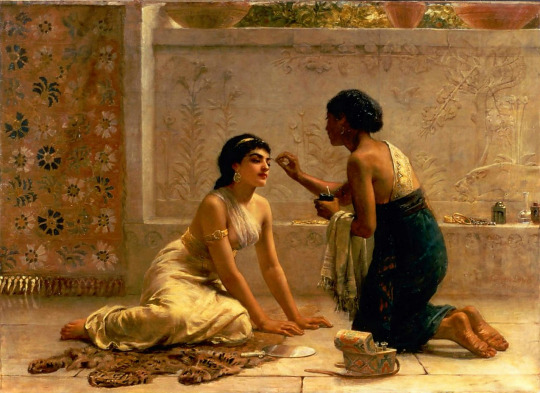
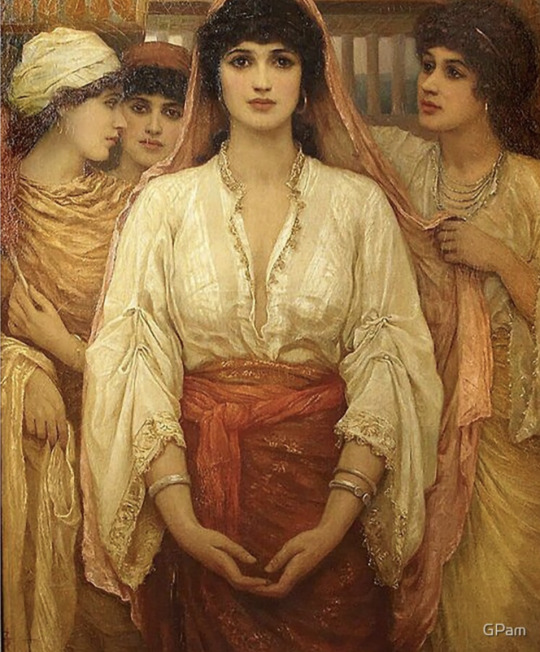
23 notes
·
View notes
Text

For he shall grow up before him as a tender plant, and as a root out of a dry ground: he hath no form nor comeliness; and when we shall see him, there is no beauty that we should desire him.
He is despised and rejected of men; a man of sorrows, and acquainted with grief: and we hid as it were our faces from him; he was despised, and we esteemed him not.
Surely he hath borne our griefs, and carried our sorrows: yet we did esteem him stricken, smitten of God, and afflicted.
But he was wounded for our transgressions, he was bruised for our iniquities: the chastisement of our peace was upon him; and with his stripes we are healed.
All we like sheep have gone astray; we have turned every one to his own way; and the Lord hath laid on him the iniquity of us all.
He was oppressed, and he was afflicted, yet he opened not his mouth: he is brought as a lamb to the slaughter, and as a sheep before her shearers is dumb, so he openeth not his mouth.
He was taken from prison and from judgment: and who shall declare his generation? For he was cut off out of the land of the living: for the transgression of my people was he stricken. Isaiah 53:2-8
Artwork: Jesus Christ by Georg Cornicelius, 1888.
#bible verse#isaiah 53#old testament#hebrew bible#jesus christ#yeshua#jesus#new testament#bible#words#art#Georg Cornicelius
14 notes
·
View notes
Text
2 And I declared that the dead,
who had already died,
are happier than the living,
who are still alive.
3 But better than both
is the one who has never
been born,
who has not seen the evil
that is done under the sun.
Ecclesiastes 4:2-3
New International Version (NIV)
#eclesiastes#thoughts#random thoughts#dark#academia#dark academia#philosopher#hebrew bible#hebrew#old testament#philosophy
18 notes
·
View notes
Text
Four Criteria the Messiah Must Fulfill
by Jews for Jesus | July 01 2000
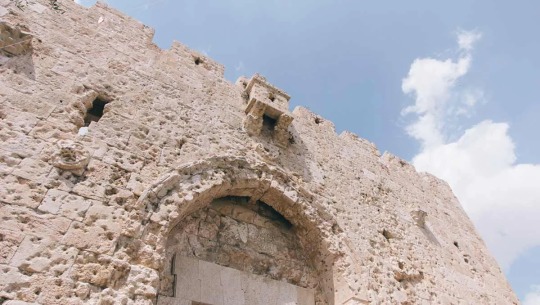
So what’s the deal with the Messiah? For many, the Messiah figure seems like an ancient Jewish version of Superman—a childhood hero on whom most of us have long since given up. But according to the Talmud and the Jewish Scriptures the Messiah is not only real, but should have arrived a long time ago.
Maybe a Messiah who never comes is not such a big deal, but a God Who breaks His promises is a very big deal. The detailed messianic timetable in Daniel 9 allows us to explore solutions to these questions. Not only is there much more to be known about the Messiah, but we can know exactly when to expect him!
Fact One: The Messiah would arrive in a certain time frame.
The details of when Messiah will arrive are written in the book of Daniel. This prophet lived during the time of our exile in Babylon and received a vision that the Messiah would come 483 years after the command to restore Jerusalem and rebuild the Temple:
From the issuing of the decree to restore and rebuild Jerusalem until an Anointed One [ad mashiach], the ruler [nagid], will be seven weeks and sixty-two weeks. It will be rebuilt with a plaza and a moat, but in difficult times. (Daniel 9:25, CBS)
The “clock” on these 69 “weeks” (units of seven years) began ticking when Artaxerxes issued a decree to Nehemiah to rebuild the Temple and restore Jerusalem (Nehemiah 2:1-8). While other decrees went out, this was the only one that involved both the Temple and Jerusalem. History records this took place in Nisan (March/April) of 444 B.C.E. That would mean the Messiah would appear by 33 C.E. History does not record anyone, other than Yeshua (Jesus), who was from that time period and claimed to be the Messiah.
Fact Two: The Messiah would come before the destruction of the Second Temple.
Daniel predicted that after the appearance of Messiah, “…the people of a prince that shall come shall destroy the city and the sanctuary” (Daniel 9:26, JPS). We know that occurred when Titus’ Roman legions marched on Jerusalem in 70 C.E., destroying both the city and the Temple. The Talmud teaches that at that time people believed that the time of Messiah had already come, but because of the sins of the nation the messianic kingdom was withheld at the time it should have arrived.
The school of Eliyahu taught: Six thousand years is the duration of the world. Two thousand of the six thousand years are characterized by chaos; two thousand years are characterized by Torah, from the era of the Patriarchs until the end of the mishnaic period; and two thousand years are the period of the coming of the Messiah. That is the course that history was to take, but due to our sins that time frame increased. The Messiah did not come after four thousand years passed, and furthermore, the years that elapsed since then, which were to have been the messianic era, have elapsed. (Sanhedrin 97a and b [emphasis added])
Other passages support the understanding that the Messiah would come while the Temple was still standing. The psalm is one of the Hallel Psalms which praises God for His deliverance of Israel and of Israel’s leader, the king. Israel was rejected by its enemies, as was its king.
Hoshienu—Save now, I pray, O Lord; O Lord, I pray, send now prosperity. Blessed is he who comes in the name of the Lord! We have blessed you from the house of the Lord [emphasis added]. (vv. 25,26)
The only way that they could bless the Messiah from the house of the Lord was if the Temple was still standing! Ironically, these are the same words the Jewish people used to greet Yeshua when he rode into Jerusalem the week before Passover (Matthew 21:9–12).
Haggai, who was in Jerusalem as the Second Temple was being built, made the messianic prediction that the “glory of this last temple is to be greater than that of the first” (2:9).1 And Malachi confirmed it: “Then suddenly the Lord you are seeking will come to his Temple; the messenger of the covenant, whom you desire, will come” (3:1). Twelfth century Jewish scholar, Rabbi David Kimchi (also known as Radak), equated Malachi’s messenger of the covenant with the Messiah.2
According to Daniel, the Temple would not only be standing at Messiah’s appearance, but it would be destroyed soon after. That Temple, which was originally built by Ezra and beautified by Herod, was where Yeshua did most of his teaching and claimed to be the Messiah. The New Testament records the painful words of Yeshua to those who spoke of how beautiful the Temple looked after its refurbishing under Herod: “These things which you see—the days will come in which not one stone shall be left here upon another that shall not be thrown down.”3 Yeshua was pointing to Daniel’s prophecy being fulfilled. Less than 40 years later the destruction of the Temple was so thorough that, to this day, the exact location of the sanctuary is unknown.
Fact Three: The Messiah’s lineage could only be identifiable while the Temple stood.
The coming of the Messiah had another time constraint: it was connected to his descent from the tribe of Judah.
The scepter shall not depart from Judah, nor a lawgiver from between his feet, until Shiloh comes; [emphasis mine] and to Him shall be the obedience of the people. (Genesis 49:10)
This well-recognized messianic prophecy indicated that Judah was to retain its identity until Shiloh (one of the names for the Messiah according to rabbinical literature) was to come.
Apropos the Messiah, the Gemara asks: What is his name? The school of Rabbi Sheila says: Shiloh is his name, as it is stated: “Until when Shiloh shall come.” (Sanhedrin 98b)
According to the book of Ezra (1:5-8), Judah’s position was maintained throughout the 70 years of captivity in Babylon. It was also intact back in the Land, until the Romans made the kingdom of Judah a Roman province. While there was a provincial government in place, about 50 years later (in 70 c.e.) that too ended.
Not only was the Messiah to be from the lineage of Judah, but more specifically from the house of David: “I have made a covenant with My chosen, I have sworn to My servant David: ‘Your seed I will establish forever, And build up your throne to all generations’” (Psalm 89:3-4 NKJV). This messianic prophecy clearly refers to a descendant of David. Proof of such lineage was destroyed when the Temple was destroyed.
And while we do not have the Temple records, we do have the record of Yeshua’s family tree in the accounts of his life by both Luke and Matthew. They both identify that he is from the house of David. We don’t know anyone else who lived at that time and claimed to be the Messiah, who is descended from the tribe of Judah and the house of David, apart from Yeshua.
Fact Four: The Messiah would be cut off.
The Daniel prophecy (9:26) says that after the seven weeks and sixty-two weeks, the Messiah would be cut off, but not for himself. This phrase “cut off” meant to be killed or destroyed, often used in the Tanakh to describe how a sacrificial animal was ritually slaughtered (Gen. 15:18; Jer. 34:18).
The idea that the Messiah would die was not new to Judaism. Isaiah wrote of one who would suffer and die for the sins of the people: “…For He was cut off from the land of the living; For the transgressions of My people He was stricken.”4 Psalm 22 graphically portrays death by crucifixion, a method of execution not known to the author writing one thousand years before Yeshua was crucified.
Could it have happened just as Daniel so carefully predicted? Counting 483 years after Artaxerxes’ decree would bring us to 33 c.e. The Temple was destroyed in 70 c.e. That leaves a window of 37 years in which the Messiah from the tribe of Judah and the house of David could come. Not only that, but he was to die a violent death at that time.
Has Messiah Already Come?
God promised our people a Messiah, and He gave us a way of computing the time he’d be coming. Think about it. If Daniel is right and the Messiah came before the destruction of the Second Temple, that means we have to admit that the Messiah has already come. And if he’s already come, then who is he?
He had to arrive before 33 C.E, while the Temple was still standing, needed to be an identifiable descendant of David, and would be killed before the Temple was destroyed. The details of these facts together present some of the strongest evidence that he has in fact already come. The only person who fits that description is Yeshua from Nazareth.
Yes, for a Jewish person to consider the idea that Jesus might be the Messiah seems extreme. But every single one of us has been there and we’ve all come to believe that Jesus is exactly who he claimed to be.
If you’re unsure, why not ask God? The same God who communicated to us about when the Messiah would come and who he would be wants to reveal the truth to you, but it requires an open heart. He says, “Call to me and I will answer you, and will tell you great and hidden things that you have not known” (Jeremiah 33:3). Do you have the courage to call out to Him?
#jews#jewish#judaism#hebrew#hebrew bible#scriptures#israel#messiah#finding the truth#truth#just the facts
37 notes
·
View notes
Text
i thought i was all up on biblical misconceptions but it's interesting that i only noticed last night that the passover narrative in the Bible doesn't really explicitly talk about the angel of death killing the firstborn even though it feels like such a core part of the story. it mostly just talks about God doing the deed.
where an angel is implied is in Exodus 12:23, which says "For the Lord will pass through to strike down the Egyptians; when he sees the blood on the lintel and on the two doorposts, the Lord will pass over that door and will not allow the destroyer to enter your houses to strike you down."
We might infer this 'destroyer' is some kind of angel, but it also seems like God himself is the main agent here.
14 notes
·
View notes
Text

"Moses supposedly freed the Jews from slavery, then gave them strict instructions on how to be brutal slave owners themselves."
Exodus 21:2-7
When you buy a male Hebrew slave, he will serve you for six years. But in the seventh year, he will go free without any payment.
If he came in single, he will leave single. If he came in married, then his wife will leave with him.
If his master gave him a wife and she bore him sons or daughters, the wife and her children will belong to her master. He will leave single.
However, if the slave clearly states, “I love my master, my wife, and my children, and I don’t want to go free,”
then his master will bring him before God. He will bring him to the door or the doorpost. There his master will pierce his ear with a pointed tool, and he will serve him as his slave for life.
When a man sells his daughter as a slave, she shouldn’t be set free in the same way as male slaves are set free.
Exodus 21:20-21
When a slave owner hits a male or female slave with a rod and the slave dies immediately, the owner should be punished.
But if the slave gets up after a day or two, the slave owner shouldn’t be punished because the slave is the owner’s property.
Leviticus 25:44-46
Regarding male or female slaves that you are allowed to have: You can buy a male or a female slave from the nations that are around you.
You can also buy them from the foreign guests who live with you and from their extended families that are with you, who were born in your land. These can belong to you as property.
You can pass them on to your children as inheritance that they can own as permanent property. You can make these people work as slaves, but you must not rule harshly over your own people, the Israelites.
Genesis 16:8-9
And he said, Hagar, Sarai's maid, whence camest thou? and whither wilt thou go? And she said, I flee from the face of my mistress Sarai.
And the angel of the Lord said unto her, Return to thy mistress, and submit thyself under her hands.
Deuteronomy 20:13-14
And when the Lord thy God hath delivered it into thine hands, thou shalt smite every male thereof with the edge of the sword:
But the women, and the little ones, and the cattle, and all that is in the city, even all the spoil thereof, shalt thou take unto thyself; and thou shalt eat the spoil of thine enemies, which the Lord thy God hath given thee.
#judaism#christianity#bible#bible study#hebrew bible#old testament#god of slavery#slavery#god is pro slavery#religion#religion is a mental illness
63 notes
·
View notes
Text
(F)alse
(E)vidence
(A)ppearing
(R)eal
#do not fear#be strong#be courageous#have faith#trust god#biblejournaling#hebrew bible#god is my refuge#god is my strength#remember#poetry#love knows no fear#faith over fear#god fearing#unconditional love#love story#godalwaysspeaks#words of affirmation#manifesting#open heart#writethestory#relationships quotes#healingjourney#yahweh#bible
9 notes
·
View notes
Text
youtube
Why Does the Number 7 Appear Everywhere in Religion?
#religion#ancient religion#judaism#christianity#islam#buddhism#hebrew bible#new testament#sacred math#777#religion for breakfast#video#divinum-pacis#Youtube
6 notes
·
View notes
Text

Are you ready to elevate your Hebrew conversations?
Mastering the present tense of the verb 'ללמוד' (to learn) is a great way to do just that.
Not only will this enhance your everyday dialogues, but it will also empower you to discuss your learning journey, your interests, and even your professional growth—all in fluent Hebrew!
Save this in-depth guide that will make this verb second nature to you, setting you on the path to Hebrew mastery 🌟
#hebrew#jewish#learnhebrew#hebrewbyinbal#language#hebrew langblr#israel#jew#torah#trending#verbs#verb#to learn#language lessons#hebrew language#hebrew alphabet#hebrew bible#hebrew israelites#hebrew names#hebrew school#language learning#learn hebrew#jewish tumblr
14 notes
·
View notes
Text
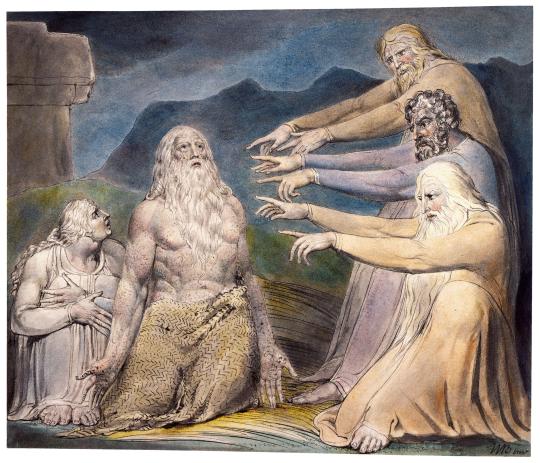
Job Rebuked by His Friends, William Blake, 1805
#art#art history#William Blake#religious art#Biblical art#Christian art#Christianity#Old Testament#Hebrew Bible#Book of Job#wisdom literature#Romanticism#Romantic art#English Romanticism#British art#English art#19th century art#pen and ink#watercolor#Morgan Library and Museum
819 notes
·
View notes
Link
22 notes
·
View notes
Text
This is an aspect of this time-honored story that sometimes troubles me, and I know that different Biblical scholars as well as different lay people have very different views on it.
Note #1: Please don't reblog with answers that only relate to adaptations of the story. For example, "What he does is wrong, but his wife Asenath calls him out on it and urges him to forgive them." Not in the Bible she doesn't. No one calls him out in the original text.
Note #2: Christians are free to reblog and offer opinions – this is a Biblical subject after all – but please don't preach to me about Jesus. This story isn't about Jesus. It predates Jesus by many centuries. Besides, for the time being, I'm looking at it more from a character analysis perspective than a religious perspective.
Note #3: Please don't be antisemitic. The (arguable) moral grayness of Hebrew Bible/Old Testament heroes has nothing to do with either their Jewishness or the fact that they lived before Jesus.
#the bible#hebrew bible#old testament#joseph son of jacob#joseph#joseph and the amazing technicolor dreamcoat#joseph king of dreams#joseph the dreamer#christianity#judaism#character analysis#bible story#poll
7 notes
·
View notes
Text
writing story about Vashti
for some time now I've wanted to write a fantasy story with Vashti from the Hebrew Bible/torah as a main character. I know she is interpreted negatively in a lot of traditional sources, but many jewish feminists have reclaimed her and I feel like I wanna write a cool fantasy story with her that explores misogyny, abuse, victim-blaming etc.
But since I'm not jewish I dont know if I should, if it would be appropriation. Mind you, I dont plan on publishing it.
16 notes
·
View notes
Text
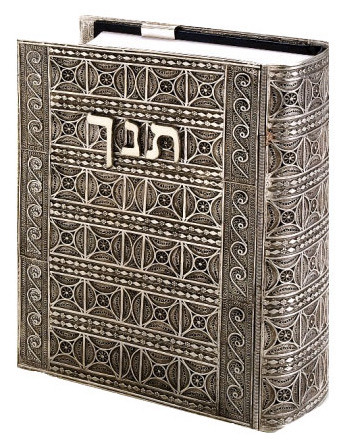
THE TANASH. Silver filigree cover by Chaim Gershi.
The Hebrew Bible is comprised of the Torah, Prophets, and Hagiographa.
#beautiful books#book blog#books books books#book cover#books#silver#tanash#judiasm#hebrew bible#torah#book binding#book design
31 notes
·
View notes